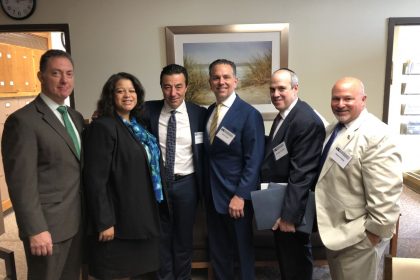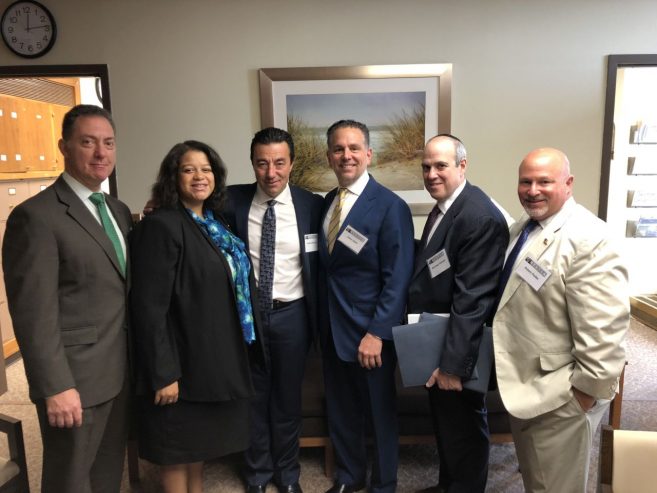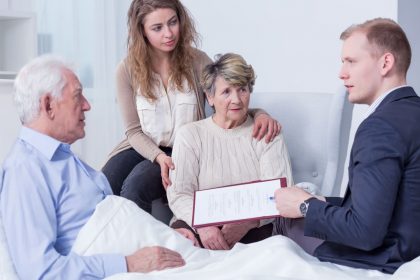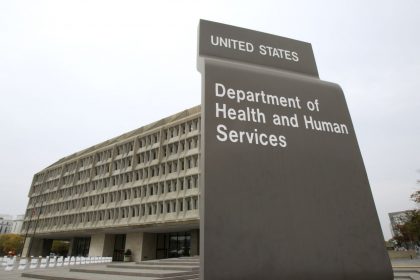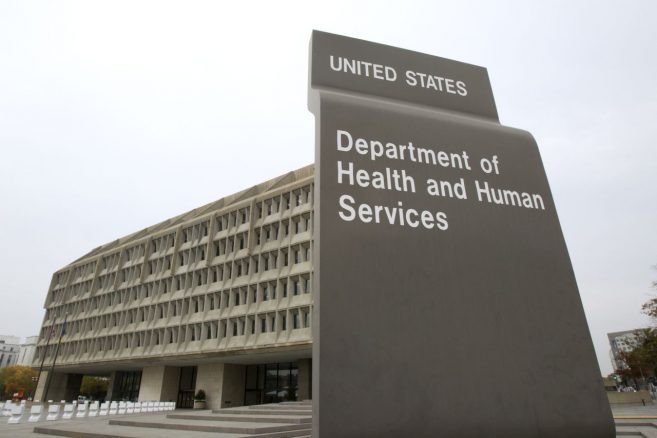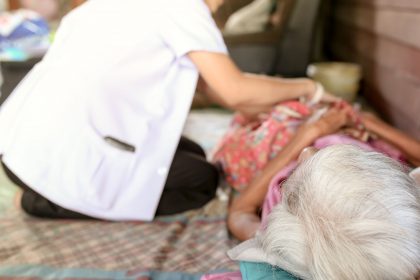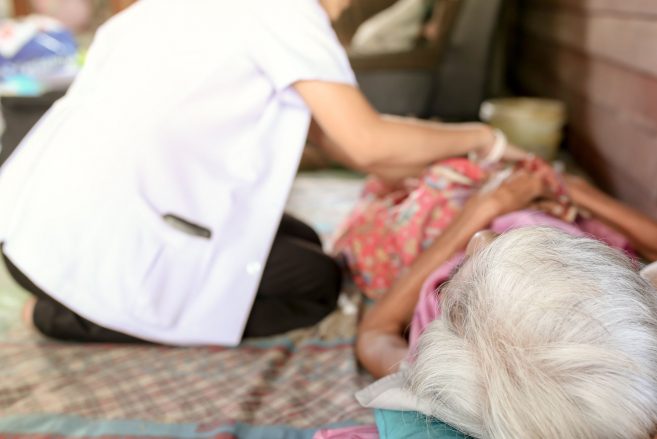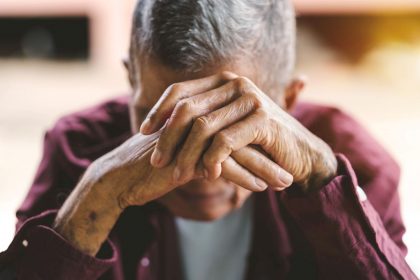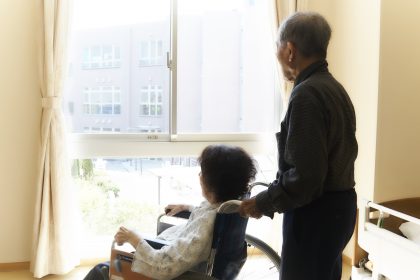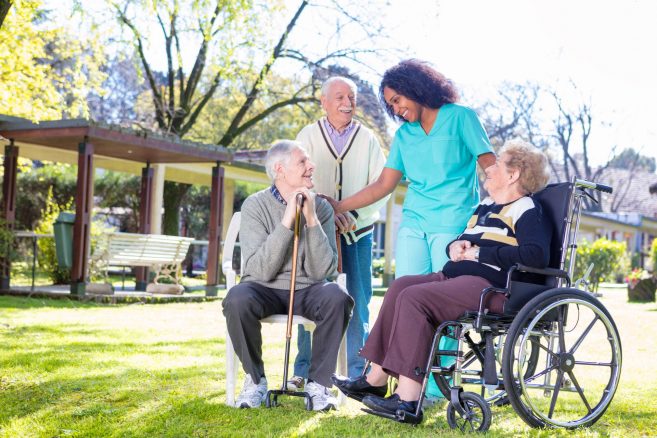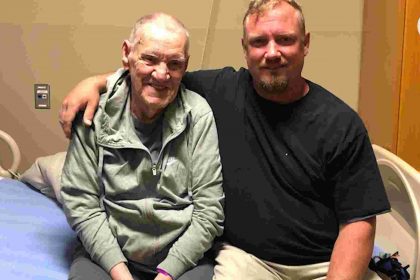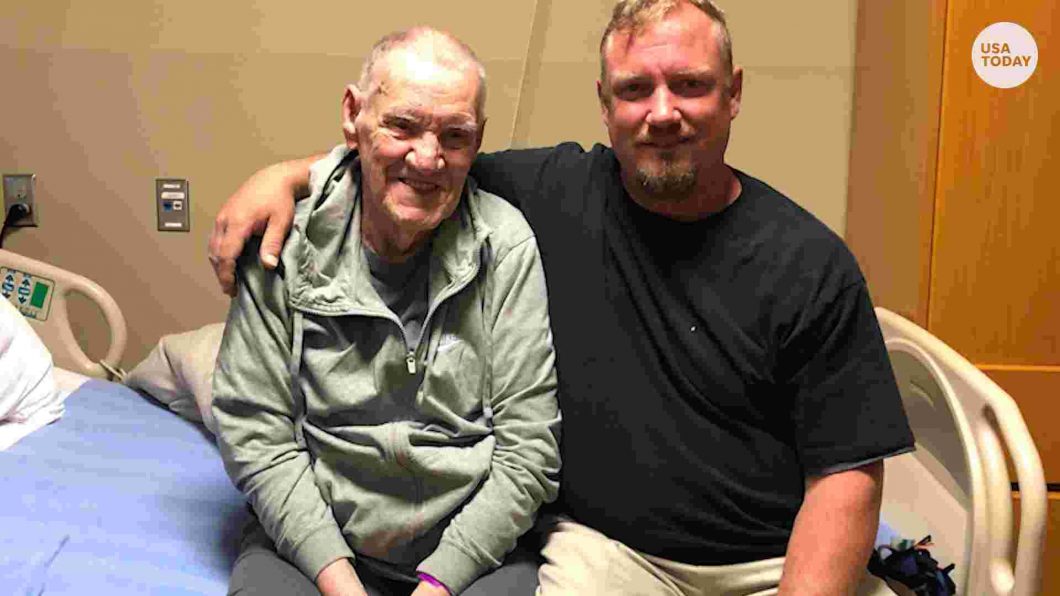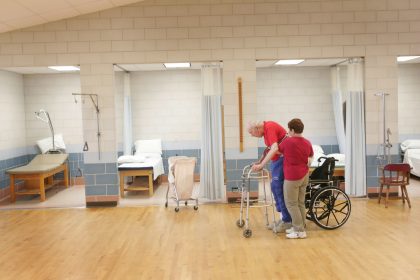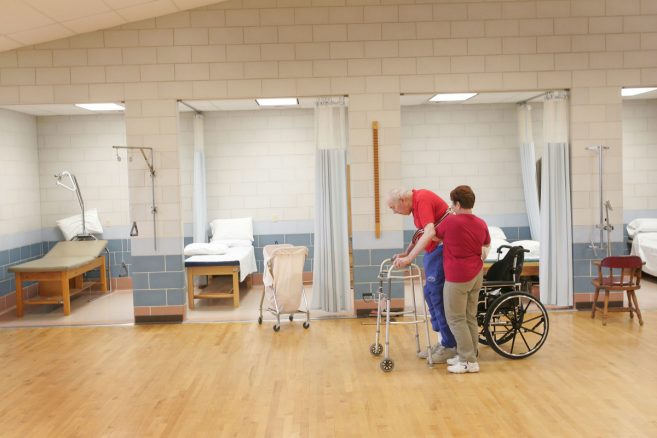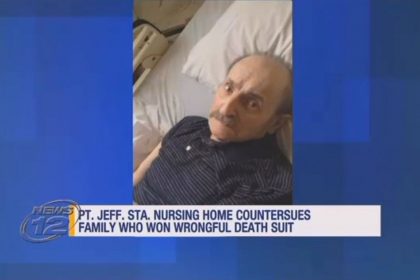Contact Dalli & Marino LLP
Dalli & Marino, LLP has been providing top-tier representation, and we have recovered millions of dollars, for families in cases of nursing home and other skilled care/elder care facility neglect and results of understaffing, in Suffolk and Nassau Counties (Long Island), Manhattan, Brooklyn, the Bronx, Queens, Staten Island, and Westchester County, since 1995. Please contact our team to discuss your case, or with any questions, at 1-888-465-8790 [Toll-Free], or by completing the CASE EVALUATION Form on our Contact Page. Read MoreForced Arbitration Clauses Prevent You From Suing A Nursing Home In Court for Neglect Or Abuse of a Loved One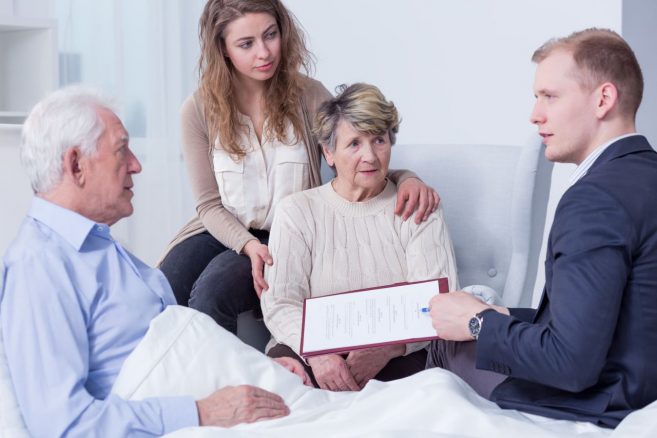
Placing a family member in a nursing home is stressful. It can be even more traumatic when a choice must be made quickly because a loved one needs skilled nursing care after being discharged from a hospital after an illness or surgery. You must often sign a large, multi-page admissions agreement in order for the patient to be admitted to that facility. But unfortunately, the “fine print” can come back to haunt you. Many nursing homes now include forced arbitration clauses in these agreements.
What Do Forced Arbitration Clauses Mean to You?
“Nursing homes are often understaffed, creating environments ripe for neglect and abuse,” said John Dalli, a partner at the law firm Dalli & Marino. “Forced arbitration clauses allow these facilities to avoid a lawsuit for damages if a resident is injured or harmed under their care. This effectively eliminates nursing home residents’ rights to have a jury of their peers hear their case.”
Instead of suing a nursing home for damages in court, you’re agreeing that an arbitrator from an outside private arbitration company will decide the facts in your case.
But this puts you at a disadvantage in many ways:
- The nursing home is often a repeat customer for the arbitrator whose personal bias often tilts final decisions towards the facility.
- There are no public records for decisions made by private arbitrators. So there’s no way of knowing how similar claims against the facility were decided.
- A bad decision by an arbitrator is almost impossible to overturn on appeal in a courtroom — even if that decision is flat out wrong.
So What’s a Family To Do?
“Families are so stressed in these time-sensitive situations, they’ll likely just sign the contract to make sure their loved one gets into the facility. Nursing homes know that,” said Sal Marino, a partner at Dalli & Marino. “But ask a lawyer to quickly review the agreement before signing it. If you emphasize the urgency of the situation, they should be able to give you a fast, objective assessment.”
Contact Dalli & Marino LLP
Dalli & Marino, LLP has been providing top-tier representation, and we have recovered millions of dollars, for families in cases of nursing home and other skilled care/elder care facility neglect and results of understaffing, in Suffolk and Nassau Counties (Long Island), Manhattan, Brooklyn, the Bronx, Queens, Staten Island, and Westchester County, since 1995.
Please contact our team to discuss your case, or with any questions, at 1-888-465-8790 [Toll-Free], or by completing the CASE EVALUATION Form on our Contact Page.
Read MoreA June 2019, report from the United States Department of Health and Human Services, Office of the Inspector General, made the following determinations:
“We determined that an estimated one in five high-risk hospital ER Medicare claims for treatment provided in calendar year 2016 were the result of potential abuse or neglect, including injury of unknown source, of beneficiaries residing in a SNF. We determined that SNFs failed to report many of these incidents to the Survey Agencies in accordance with applicable Federal requirements. We also determined that several Survey Agencies failed to report some findings of substantiated abuse to local law enforcement. Lastly, we determined that CMS does not require all incidents of potential abuse or neglect and related referrals made to law enforcement and other agencies to be recorded and tracked in the Automated Survey Processing Environment Complaints/Incidents Tracking System. Preventing, detecting, and combating elder abuse requires CMS, Survey Agencies, and SNFs to meet their responsibilities.”
The report was shared by the organization, National Consumer Voice for Quality Long-Term Care (TheConsumerVoice.org), and can be downloaded here:
Contact Dalli & Marino LLP
Dalli & Marino, LLP has been providing top-tier representation, and we have recovered millions of dollars, for families in cases of nursing home and other skilled care/elder care facility neglect and results of understaffing, in Suffolk and Nassau Counties (Long Island), Manhattan, Brooklyn, the Bronx, Queens, Staten Island, and Westchester County, since 1995.
Please contact our team to discuss your case, or with any questions, at 1-888-465-8790 [Toll-Free], or by completing the CASE EVALUATION Form on our Contact Page.
Read More
Not all of the 15,000+ nursing homes in the U.S. were created equally. News headlines this month confirmed this when a Senate report revealed that for budget reasons nearly 400 troubled nursing homes were left off of a federal agency’s watch list of 80 facilities flagged for poor resident care.
If you have a loved one in a nursing home, be mindful of signs of neglect or even abuse no matter how well the facility has been rated. For example, bedsores are one of the most common injuries among nursing home residents but are also one of the hardest to find.
Bedsores in Nursing Homes
“Bedsores are the #1 sign of neglect in a nursing home. Why? Because their appearance means there isn’t enough staff to take proper care of residents, especially those with diabetes and poor circulation or those who are wheelchair or bedbound,” said John Dalli, a partner in the law firm Dalli & Marino, LLP. “Bedsores are the most preventable of all injuries in a nursing home.”
Some estimates indicate up to 13% of all nursing home residents suffer from bedsores. So, what are they?
Pressure Ulcers Defined
The National Pressure Ulcer Advisory Panel defines a pressure ulcer, also called a bedsore or a pressure sore, as “localized damage to the skin and underlying soft tissue usually over a bony prominence or related to a medical or other device.”
Bedsores occur when a person does not move from one position for an extended period of time. Some can develop after just 2-3 hours, according to Johns Hopkins University. Staying in just one position can put “pressure on certain areas of the body.” This pressure “can reduce the blood supply to the skin and the tissues under the skin.” If a person doesn’t move around often enough, “the blood supply gets too low, and a sore may form.”
Bedsores appear in certain areas of the body, often in “bony parts that don’t have much fat to pad them.” The lower back, heels and hips are a common place that bedsores can develop. These wounds can also occur on “the base of the spine “(tail bone), the shoulder blades, the backs and sides of the knees, and the back of the head.”
“All of these areas are often covered up by gowns and bedding, making bedsores hard to detect,” said Dalli. “When visiting your loved ones, lift the sheets, check their bodies, offer to rub cream on their backs. You want to look for discolored skin or actual sores.”
According to the American Academy of Family Physicians, there are four stages of bedsores:
Stage 1: “The affected skin looks red and may feel warm to the touch. The area may also burn, hurt or itch. In people who have dark skin, the pressure sore may have a blue or purple tint.”
Stage 2: The sore will be painful and possibly discolored. It may be an open would “that looks like an abrasion or a blister.”
Stage 3: The sore is even worse, taking on a “crater-like appearance due to increased damage to the tissue below the skin’s surface.”
Stage 4: “The skin and tissue is severely damaged, causing a large wound. Infection can occur at this stage. Muscles, bones, tendons and joints can be affected.”
What should you do if you spot bedsores?
“Alert the nursing staff and physician immediately,” said Dalli. “A bedsore will only get worse, causing a medical emergency.”
(References FamilyDoctor.org. © 2019 American Academy of Family Physicians. All Rights Reserved.)
Contact Dalli & Marino LLP
Dalli & Marino, LLP has been providing top-tier representation, and we have recovered millions of dollars, for families in cases of nursing home and other skilled care/elder care facility neglect and results of understaffing, in Suffolk and Nassau Counties (Long Island), Manhattan, Brooklyn, the Bronx, Queens, Staten Island, and Westchester County, since 1995.
Please contact our team to discuss your case, or with any questions, at 1-888-465-8790 [Toll-Free], or by completing the CASE EVALUATION Form on our Contact Page.
Read More
World Elder Abuse Awareness Day is Saturday, June 15. But recent data about abuse and senior citizens reveals a growing problem that should have our attention each day.
At least one in 10 Americans above the age of 60 has experienced some type of abuse according to the Centers for Disease Control and Prevention. The same agency reports an alarming +53% increase in non-fatal assaults against adults 60+ from 2008-2016.
For nursing home residents, the potential for neglect and abuse only increases.
“Nursing home residents are often frail, requiring extra care and supervision,” said Sal Marino, a partner in the law firm Dalli & Marino, LLP. “Most instances can be traced to a lack of proper staffing at the facility. The signs can be subtle, so you have to know what you’re looking for.”
Some telltale signs of abuse in nursing homes include:
Bedsores
Also called pressure sores, these injuries occur when a patient sits or lies in one position too long, cutting off blood circulation to the skin and tissues underneath. The sores become more severe the longer they are untreated. An estimated 13% of nursing home residents experience bedsores.
Falls
Nursing home residents fall with alarming regularity. About half of the 1.6 million patients in nursing homes fall each year, according to the Agency for Healthcare Research and Quality. Many of these falls occur due to a lack of proper monitoring by staff or an unsafe environment, such as bad lighting or uneven floors.
Medication Errors
If a resident changes behavior, appearing lethargic or confused, there may be errors in their prescribed medications. Each resident’s drug regimen must be free from unnecessary drugs and excessive doses.
Dehydration/Malnutrition
Weight loss may indicate improper levels of nutrition and protein in their diets.
If a resident needs help eating, a nursing home must provide that assistance. Malnutrition and dehydration can also complicate bedsores.
Physical abuse and neglect
A nursing home resident is legally protected from verbal, mental, sexual, or physical abuse as well as involuntary seclusion.
You have several options if you suspect abuse of any kind according to John Dalli, a partner at Dalli & Marino.
“If you trust the nursing home management, you can report your concerns and ask for a swift review, said Dalli. “You can also contact a New York state ombudsman, who investigates complaints against nursing homes or to the Adult Protective Service Agency. An attorney can also help you file reports with a number of other appropriate organizations.”
Contact Dalli & Marino LLP
Dalli & Marino, LLP has been providing top-tier representation, and we have recovered millions of dollars, for families in cases of nursing home and other skilled care/elder care facility neglect and results of understaffing, in Suffolk and Nassau Counties (Long Island), Manhattan, Brooklyn, the Bronx, Queens, Staten Island, and Westchester County, since 1995.
Please contact our team to discuss your case, or with any questions, at 1-888-465-8790 [Toll-Free], or by completing the CASE EVALUATION Form on our Contact Page.
Read MoreDespite strong safeguards to protect residents from unwanted and unsafe discharges from a nursing home, inappropriate discharges are a growing problem for seniors and their families. Below is a joint statement from LTCCC and the Center for Medicare Advocacy on new findings related to this problem. The statement can also be found on our website at https://nursinghome411.org/nursing-home-study-finds-discharges-linked-to-medicare-copayments/.
NURSING HOME STUDY FINDS DISCHARGES LINKED TO MEDICARE COPAYMENTS
Background. Medicare beneficiaries are entitled to a maximum of 100 days of skilled nursing facility (SNF) care in a benefit period when they meet specific coverage criteria. However, Medicare Part A only covers the full cost of a beneficiary’s skilled care during the first 20 days of a nursing home stay. Starting on day 21, beneficiaries are responsible for paying a daily copayment ($170.50 in 2019). A recently published study in the Journal of the American Medical Association (JAMA) Internal Medicine, entitled “Association Between High Discharge Rates of Vulnerable Patients and Skilled Nursing Facility Copayments,” indicates that nursing homes seem to be discharging residents immediately before the daily copayment takes effect.
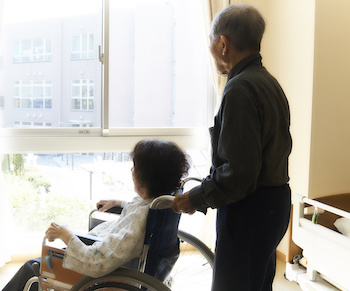 Study. Looking at a population of beneficiaries in traditional Medicare, the study finds that Medicare beneficiaries are “more often discharged from SNFs on benefit day 20 than on benefit days 19 or 21.” Beneficiaries discharged from nursing homes tend to be racial and ethnic minorities and to live in lower socioeconomic areas. Additionally, beneficiaries discharged on day 20 are also “more likely to have 5 or more comorbidities (42.2%) than patients discharged on days 19 and 21 (39.9% and 40.6%, respectively . . .).” The study’s authors note that, in some cases, nursing homes may be “prematurely discharg[ing] some patients to avoid the risk of accruing bad debt from partially uncompensated postacute care.”
Study. Looking at a population of beneficiaries in traditional Medicare, the study finds that Medicare beneficiaries are “more often discharged from SNFs on benefit day 20 than on benefit days 19 or 21.” Beneficiaries discharged from nursing homes tend to be racial and ethnic minorities and to live in lower socioeconomic areas. Additionally, beneficiaries discharged on day 20 are also “more likely to have 5 or more comorbidities (42.2%) than patients discharged on days 19 and 21 (39.9% and 40.6%, respectively . . .).” The study’s authors note that, in some cases, nursing homes may be “prematurely discharg[ing] some patients to avoid the risk of accruing bad debt from partially uncompensated postacute care.”
Advocacy Tip. Medicare beneficiaries facing an involuntary discharge from a nursing home have appeal rights under both Medicare and the federal Nursing Home Reform Law. The termination of a resident’s Medicare coverage does not necessarily mean that a nursing home can or should discharge the resident from the facility. It is important to know that distinct notice and appeal rights apply in these situations:
- Medicare-Covered Stay. Nursing homes are required to provide Medicare beneficiaries with a Notice of Medicare Non-Coverage (NOMNC) two days before Medicare-covered services end. The NOMNC provides instructions on how to file an appeal.
- Nursing Home Reform Law. Nursing homes can only discharge residents under very limited circumstances. Generally, nursing homes must give residents notice 30 days before the discharge and residents are entitled to appeal the discharge notice.
Remember. Nursing homes must not terminate Medicare-covered skilled nursing and/or therapy services solely on the basis that a resident is not improving. Under the Settlement Agreement in Jimmo v. Sebelius, No. 5:11-CV-17 (D. VT), the Centers for Medicare & Medicaid Services (CMS) confirmed that Medicare coverage is based on a beneficiary’s need for skilled care, not on his or her potential for improvement. Medicare policy now clearly states that “[s]killed care may be necessary to improve a patient’s condition, to maintain a patient’s current condition, or to prevent or slow further deterioration of the patient’s condition.”
- For more information about appealing a Medicare termination based on an erroneous “Improvement Standard,” please visit: https://www.medicareadvocacy.org/wp-content/uploads/2018/10/Jimmo-SNF-Checklist-Toolkit-00321779xC6348.pdf.
- To learn more about notice and appeal rights, please visit: https://www.medicareadvocacy.org/discharge-from-a-skilled-nursing-facility-what-does-it-mean-and-what-rights-does-a-resident-have/.
- To learn more about the limited circumstances under which a nursing home can discharge a resident, please visit: https://nursinghome411.org/fact-sheet-nursing-home-transfer-discharge-rights/.
Long Term Care Community Coalition
www.nursinghome411.org
One Penn Plaza, Suite 6252
New York, NY 10119
United States
You now have greater access to information and reviews that help you compare nursing homes in your community, according to the Centers for Medicare and Medicaid Services (CMS). Its press release “CMS Improving Nursing Home Compare in April 2019” announces upgrades to its online tool “Nursing Home Compare” which offers these valuable insights via its Five-Star Quality Rating System.
Nursing Home Compare gives each facility an overall rating between one and five stars, with five indicating the highest quality. In addition, each nursing home is rated separately on the following categories:
- Compliance with Medicare and Medicaid healthy and safety requirements
- Staffing levels available to care for patients at the home at a given time.
- Quality measures based on resident assessment and Medicare claims data.
CMS Administrator Seema Verma states, “Our goal is to drive quality improvements across the industry and empower consumers to make decisions with more confidence for their loved ones.”
Sal Marino, partner at law firm Dalli & Marino, LLP, applauds the CMS’s efforts and offers his own advice to families.
“The more transparency there is around nursing home quality, the easier it is for a family to find the best facility for their needs,” said Marino. “Families should also research Better Business Bureau reviews and contact other friends and families for feedback on their personal experiences with area nursing homes.”
Important to note that the CMS gives a nursing home an automatic downgrade to one star if no registered nurse was on-site for four days or more in one quarter.
Read The Complete Article By Clicking On This Link
Contact Dalli & Marino LLP
Dalli & Marino, LLP has been providing top-tier representation, and we have recovered millions of dollars, for families in cases of nursing home and other skilled care/elder care facility neglect and results of understaffing, in Suffolk and Nassau Counties (Long Island), Manhattan, Brooklyn, the Bronx, Queens, Staten Island, and Westchester County, since 1995.
Please contact our team to discuss your case, or with any questions, at 1-888-465-8790 [Toll-Free], or by completing the CASE EVALUATION Form on our Contact Page.
Read MoreA News 12 Long Island Story, April 22 (*updated April 23), was entitled, “‘Slap in the face’: Nursing home countersues family who won wrongful death suit.” It explained that: “A jury awarded $1 million to the family of wheelchair-bound Salvatore Niosi six years after his choking death at Woodhaven Center of Care in Port Jefferson Station. The jury found that a facility nurse forgot to put in Niosi’s dentures and fed him a sandwich, leading him to choke on the food.” According to News 12, “Silvia Teixeira, Niosi’s daughter, filed a wrongful death lawsuit against the nursing home after learning from homicide detectives that her father’s death was caught on a surveillance camera at the nurse’s station.” A jury found “that a facility nurse forgot to put in Niosi’s dentures and fed him a sandwich, leading him to choke on the food,” and a Teixeira stated in the story that, “it took 20-30 minutes for someone at the facility to call 911.”
Tragically, News 12 continued: “Woodhaven accepted liability for Niosi’s death one week before the case was set to go on trial. But the center is now countersuing the family, claiming they owe the center money for Niosi’s stay there.”
READ THE STORY ON THE NEWS 12 WEBSITE BY CLICKING ON THIS LINK
All content © 2001 – 2019 Frankly and NEWS12. All Rights Reserved.
Contact Dalli & Marino LLP
Dalli & Marino, LLP has been providing top-tier representation, and we have recovered millions of dollars, for families in cases of nursing home and other skilled care/elder care facility neglect and abuse in New York City, Suffolk and Nassau Counties, (Long Island), Brooklyn, the Bronx, Queens, Staten Island, and Westchester County, since 1995.
Please contact our team to discuss your case, or with any questions, at 1-888-465-8790 [Toll-Free], or by completing the CASE EVALUATION Form on our Contact Page.
Read More